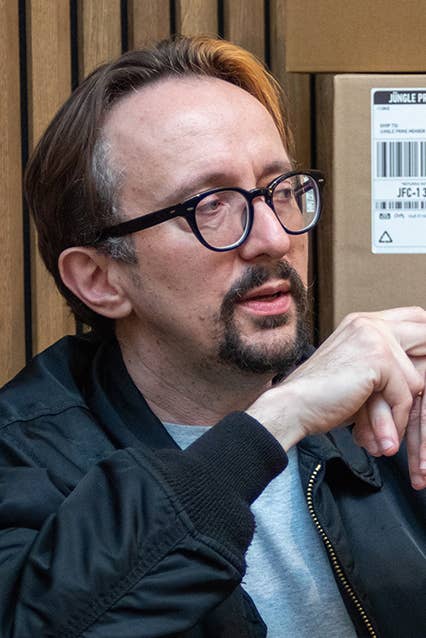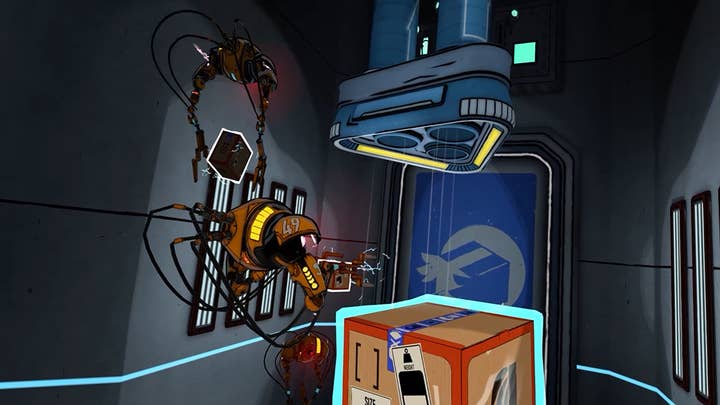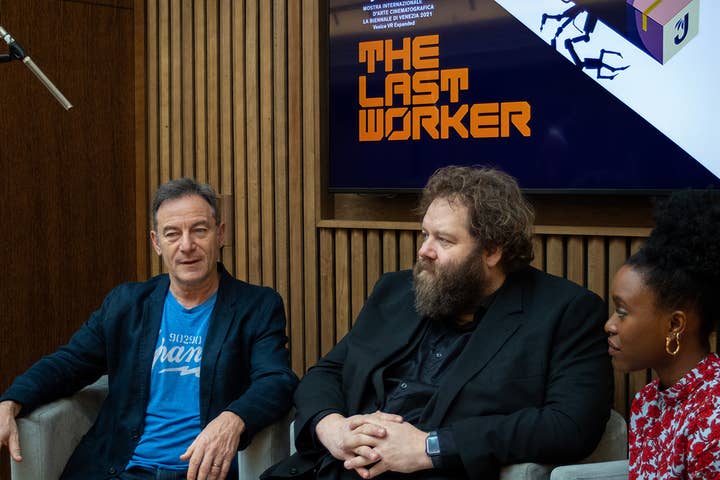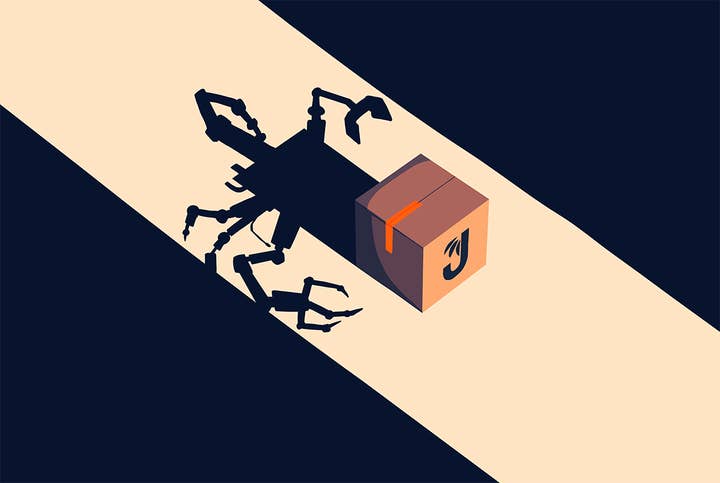The Last Worker takes a dystopian look at the future of the games industry itself
Oiffy's Jörg Tittel talks us through the philosophy behind his latest release
The Last Worker, a dystopian look at the future of capitalism from developers Oiffy and Wolf & Wood, is a game that's unafraid to wear its political leanings on its sleeve. While it directly addresses the consequences of workplace automation and corporate layoffs, there are plenty of other timely messages to be found under the game's surface, from issues of climate change to critiques of a content-driven throwaway culture.
At its core, however, it's a game very much concerned about end-stage capitalism, a theme that The Last Worker director Jörg Tittel concedes could prove potentially divisive – not that he seems altogether too concerned about that when he sits down to speak to us, shortly after the game's launch event at BAFTA in Central London. Indeed, Tittel is keen for the game to encourage discussion among players, and a change in attitudes in how they approach both video games and society in general. Of course, any game focused on a dystopian future of capitalism is bound to split opinions.

"It's interesting, because when people on the right hear the words 'end-stage capitalism,' they think I'm attacking capitalism," Tittel notes. "It's like saying my grandma has a terminal disease – it doesn't mean I hate my grandma. It just happens to be the end stage of capitalism, it's an ill creature at the moment. Does it make me a lefty to point that out? Is a doctor trying to heal somebody 'woke' now?"
The game guides the player through Tittel's vision of this ill creature by putting them in the shoes of Kurt, the eponymous 'Last Worker' at Jüngle, a futuristic parody of Amazon. Kurt has found himself as the company's sole remaining human employee after years of successive layoffs saw all of his colleagues being replaced by robots, with whom Kurt is forced to compete in order to hang onto his job.
The advent of AI-driven technologies such as ChatGPT has forced the issue of computers replacing human workers back into the forefront of everyone's minds, but the inspiration for The Last Worker's vision dates back further than that – all the way back to a supermarket checkout in 2014.
It was a Tesco in central London, to be more precise, which had been "turned into one of those dystopian pop-up shops where almost all the employees had been replaced by self-checkout tills." Tittel recounts a conversation he had with the two sole remaining employees, remarking how the sudden automation of their work had come seemingly overnight – creating a situation where they were there to service the machines, rather than the other way around.
"What I hate is that they don't look like the Terminator," Tittel jokes. "I wish they were these scary motherfuckers coming down with guns and transforming into stuff, but they're just these boring boxes that gradually replace some fundamental members of society."
Tittel applies this sceptical attitude all the way up to the high-profile leaders of the tech industry. While it would be tempting to pin Jüngle boss Josef Jüngle as a direct stand-in for Amazon founder Jeff Bezos, he's more an amalgamation of several tech leaders – a group that Tittel seemingly has nothing but disdain for, repeatedly pointing to Tesla and Twitter CEO Elon Musk's "comic book nerd complex."
"We are being run by these man-children, people that have absolutely no cultural leanings whatsoever. They think that everything has to be reduced to nothing, because they've never had a profound thought in their lives," he says. "In society at large, we're being replaced by these tech idiots who are fooling us into thinking that we can't do without them. They're gaslighting us, and I loathe that."
"The debate of whether games are art is thankfully behind us, but I want to go a step further – I think they are the greatest art form ever devised"
It's not that either The Last Worker or Tittel himself are anti-technology. Kurt is joined on his adventures through the Jüngle facility by the delightfully scouse robot Skew (voiced by Jason Isaacs). For his part, Tittel acknowledges the debt the games industry owes to tech, but is keen to stress that he hopes the games industry will learn that "we are not a tech industry."
"We are incredibly aligned with tech, but humans have been since the beginning of time," says Tittel. "What distinguishes us is that we are bringing all of human expression into one medium – it's exciting as fuck. There's no greater art form than video games. I think that the whole debate of whether games are art is thankfully behind us now, but I want to go a step further – I think they are the greatest art form ever devised."
That love for games fuels a further frustration for Tittel, a problem that he hopes The Last Worker will help to rectify – that despite their increasing cultural relevance, games rarely, if ever "get discussed around the dinner table."
One cause for that, Tittel claims, is the habit of big-budget games either avoiding political issues entirely or at least pretending to be apolitical when questioned on the matter. Tittel points to the much-derided stance of Ubisoft CEO Yves Guillemot, who has repeatedly claimed that their games avoid making political statements, despite many of Ubisoft's titles using themes ripped directly from current political affairs.

He says that it doesn't serve Ubisoft and its ilk to admit to their games' political leanings, as "they like to pretend that they're selling content – i.e. nothing, because that's what content means. It's just attention-seeking data packs. Content is just like a bucket of shit – it's vapid and has nothing to say, but it shifts units and that's what we care about. But the problem is, we're also the leading cultural medium in the world now. So if the only thing we get to sell is the stuff that's about nothing, then what are we doing to people's minds?"
As Tittel says this, it's hard not to draw parallels between The Last Worker's dystopian Amazon parody and the games industry itself. Not only does the culture of mass layoffs at otherwise profitable companies immediately hit close to home, but so too does Jüngle's primary source of business: selling unnecessary, throwaway objects that seemingly serve no meaningful purpose, or 'content,' as Tittel might describe it.
"If the only thing we get to sell is the stuff that's about nothing, then what are we doing to people's minds?"
The first handful of hours tasks the player with delivering this content, which usually takes the form of throwaway gags – with a VR headset for babies and a troll doll that looks remarkably similar to a former US President being just some of the highlights. The gags, just like the items themselves, are enjoyed for a moment – before being thrown away and forgotten about. And it's an attitude that seemingly bleeds into Tittel's view of the state of the AAA games industry itself.
"Fundamentally, most AAA games are still the same games we've been playing for 30 years," says Tittel. "We're essentially just playing Tomb Raider with better graphics over and over again. People will look at say 'oh, it was TV-like writing, it has good writing for a game!' Is that really the standard by which we should be judging game writing? We're still doing this?"
He continues: "The mechanics are still completely usually separated from the actual narrative content, the ludonarrative dissonance pretty much resonates with most games that are out there. Is it because we are indeed being automated? Is it because we are at some sort of end-stage capitalism place where content is king and content doesn't want you to think? If content is king, then I say off with his head."
It's this homogenisation of 'content'-driven AAA titles that makes Tittel wonder if we haven't all already been automated after all. And while he despairs at the state of the AAA games industry, Tittel is keen to celebrate Poncle's recent BAFTA win for their roguelike title Vampire Survivors – which Tittel describes as "a distillation of what games can be and should be."

Of course, despite Vampire Survivors lacking any real writing at all, it's nonetheless a game that seems to have given Tittel more hope for the future of the industry, and games as an art form as a whole. It's how Tittel hopes that we will all survive end-stage capitalism and a discussion that he hopes The Last Worker will incite among players and the industry at large.
"Most games are indistinguishable now. So, let's be original, let's be daring"
"The one thing that will make us stand out and make us survive automation is being ourselves fully, without any apologies, and just be original," says Tittel. "Because when everything looks the fucking same, the things that will stand out are the things they're going to win, right?
"But most games are indistinguishable now. So, let's be original, let's be daring. I think that's ultimately what The Last Worker is about. We worked so hard to make something about automation that is handcrafted with a lot of passion, and a lot of human touch."
And ultimately, that's the conversation that Tittel most wants The Last Worker to encourage most of all. An urge to reject automation – not just in a literal sense, but to reject creative automation too.
"And we just hope that people pick that up and go 'okay, shoot, let's stay human, let's stay original. Let's make something new, let's care.'"

